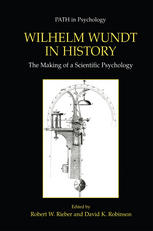

Most ebook files are in PDF format, so you can easily read them using various software such as Foxit Reader or directly on the Google Chrome browser.
Some ebook files are released by publishers in other formats such as .awz, .mobi, .epub, .fb2, etc. You may need to install specific software to read these formats on mobile/PC, such as Calibre.
Please read the tutorial at this link: https://ebookbell.com/faq
We offer FREE conversion to the popular formats you request; however, this may take some time. Therefore, right after payment, please email us, and we will try to provide the service as quickly as possible.
For some exceptional file formats or broken links (if any), please refrain from opening any disputes. Instead, email us first, and we will try to assist within a maximum of 6 hours.
EbookBell Team

4.7
106 reviewsIn this new millenium it may be fair to ask, "Why look at Wundt?" Over the years, many authors have taken fairly detailed looks at the work and accomplishments of Wilhelm Wundt (1832-1920). This was especially true of the years around 1979, the centennial of the Leipzig Institute for Experimental Psychology, the birthplace of the "graduate program" in psychology. More than twenty years have passed since then, and in the intervening time those centennial studies have attracted the attention and have motivated the efforts of a variety of historians, philosophers, psychologists, and other social scientists. They have profited from the questions raised earlier about theoretical, methodological, sociological, and even political aspects affecting the organized study of mind and behavior; they have also proposed some new directions for research in the history of the behavioral and social sciences. With the advantage of the historiographic perspective that twenty years can bring, this volume will consider this much-heralded "founding father of psychology" once again. Some of the authors are veterans of the centennial who contributed to a very useful volume, edited by Robert W. Rieber, Wilhelm Wundt and the Making of a Scientific Psychology (New York: Plenum Press, 1980). Others are scholars who have joined Wundt studies since then, and have used that book, among others, as a guide to further work. The first chapter, "Wundt before Leipzig," is essentially unchanged from the 1980 volume.